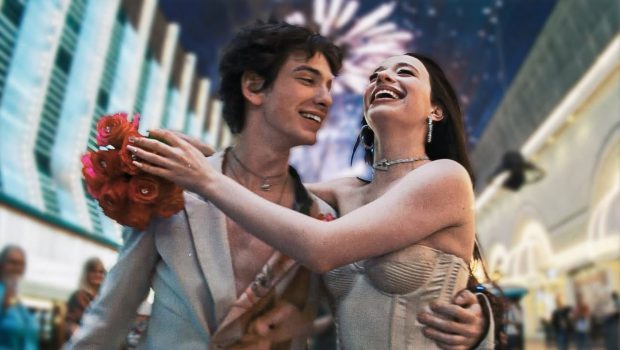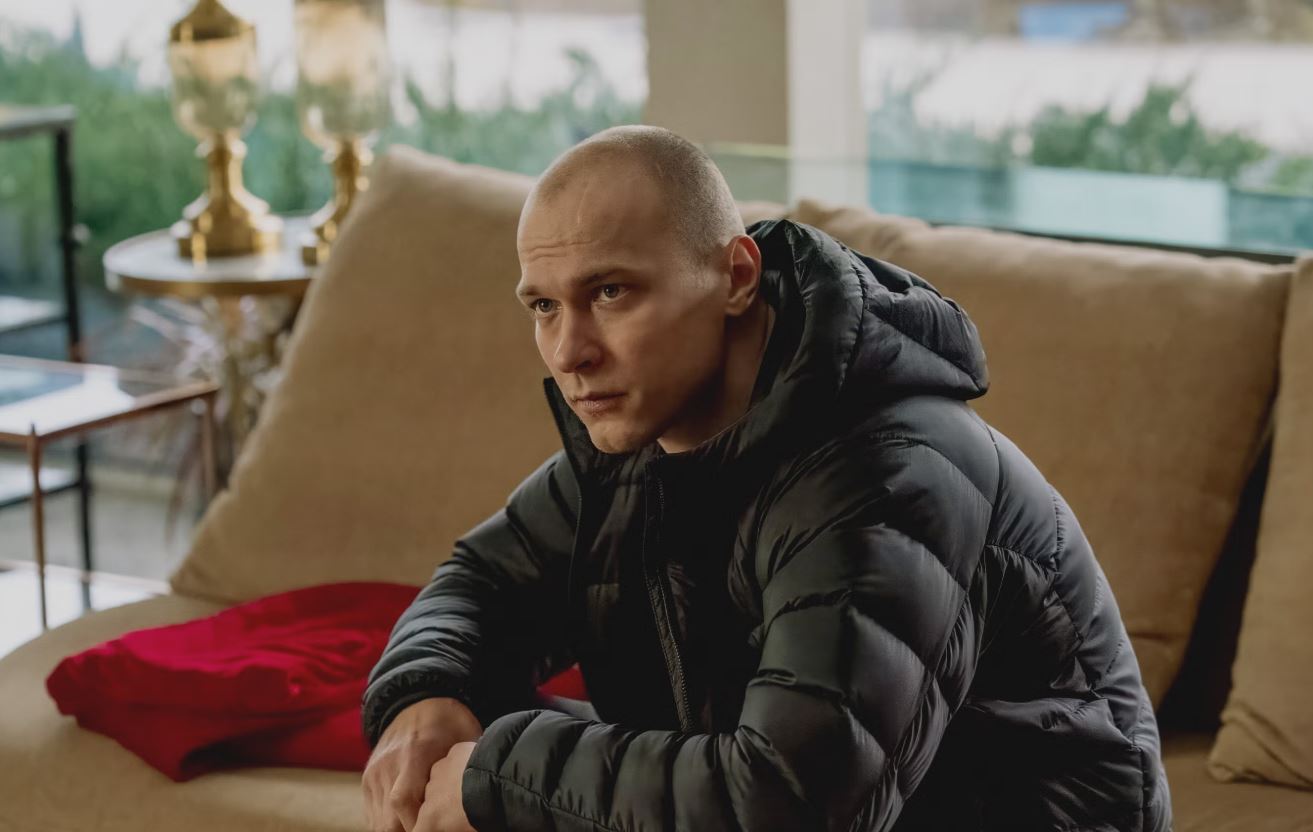Anora – Film Review
Reviewed by Damien Straker on the 22nd of January 2025
Kismet Movies presents a film by Sean Baker
Written by Sean Baker
Produced by Alex Coco, Samantha Quan, and Sean Baker
Starring Mikey Madison, Mark Eydelshteyn, Yura Borisov, Karren Karagulian, Vache Tovmasyan, and Aleksei Serebryakov
Cinematography Drew Daniels
Edited by Sean Baker
Music by Matthew Hearon-Smith
Rating: MA15+
Running time: 140 minutes
Release Date: the 26th of December 2025
Contains mild spoilers
Sean Baker continues to soar as an American filmmaker. In terms of character, pacing, and story, Anora might be his best film. His recent filmography has steadily improved. Tangerine (2015), The Florida Project (2017), and Red Rocket (2021), all depicted social issues in unique ways. More specifically, each one has dramatised sex work on screen. His filmic style for depicting this perspective has mixed high energy, intense social realism, humour, and visual flourishes. Anora is a darkly funny extension of this auteur’s imprint.
It also strongly critiques the transactional nature of the American service industry and how money eclipses trust and unconditional love. Furthermore, the film is a great showcase for actress Mikey Madison (Once Upon a Time in Hollywood, 2019). Her presence as a powerhouse actress is confirmed. She enriches scenes with dark humour and an expressiveness that underlines the deepest longing for human connection recently put on film. Anora confirms both her status and Baker’s unique touch for incredibly stylish filmmaking and deep thematic aims.
The film’s unlikely protagonist is a young woman named Ani (Madison). Though on her phone her name is listed as Anora. She is a sex worker who offers lap dances to male patrons in a flashy New York nightclub. To her dismay, her boss refuses to provide her with social benefits. One evening he asks her to attend to a young man because they need a Russian-speaking girl. While reluctant, she performs for Ivan (Mark Eydelshteyn) while speaking in both English and Russian. Unusually she also provides him with her phone number. Ian invites her home to his incredible mansion where she performs for him privately. He then explains that he can afford this incredible place because his father is a Russian oligarch. An interesting proposition is soon pitched. Ivan asks Ani if they can be exclusive for a fee. It marks the start of a unique bond.
Ivan and Ani soon party, fall in love, and hurriedly decide to marry in Nevada (important). The celebrations prompt Ani to quit her job. After the wedding, their union leaks back to Ivan’s handlers. This includes an Armenian minister named Toros (Karren Karagulian), Ivan’s godfather. Hilariously, he receives a phone call right in the middle of baptising a child and walks out of the church! Now desperate, he sends two men to the mansion, his brother Garnick (Vache Tovmasyan) and Igor (Yura Borisov), to straighten Ivan out. Eventually all three men strong arm their way inside. It leads to a terrible confrontation where they demand an immediate annulment of Ivan’s marriage. Toros even suggests Ani will need an abortion. In disbelief, Ani turns to Ivan only for him to race out the door without her. She and the three handlers must undertake a road trip to find Ivan again.
Anora is a study of how financial transactions eclipse genuine human connections. Every scene reflects the machine-like nature of the service industry and its underappreciated workers. It opens in the nightclub with the camera crabbing sideways as each girl dances for the male patrons. The movement of the apparatus reflects the machine-like state of the industry over individualism. Meanwhile, the blue colour filter and upbeat techno music evokes the manufactured sexual fantasy men pay to experience. Wisely, Baker juxtaposes these colourful, slow-motion images of sexuality with unfiltered banal quick cuts. We see Ani on the train, listening to music, and vaping after work. The contrasting images consolidate Baker’s thesis: sex work is merely a job to Ani.
She is paid to create sexual fantasies while existing as a lonely, flesh and blood person removed from most of her family in Miami (her rarely seen sister is her housemate). The fantasy element is echoed through the wide-angle shots that make the mansion visually reminiscent of a Disney castle. The home invasion is then staged somewhere between an episode of The Jerry Springer Show, a wrestling match, and a slapstick comedy. Toros and his team are hired to babysit Ivan, which shatters Ani’s dream of comfort and happiness. The tonal shifts in mood and action reflect the oscillation between reality and fantasy, the disturbing and humorous. These stylistic choices show how business transactions dissolve the individuality of service workers, and the trust once found in a lonely heart.
While the value of service workers like Ani is a critical theme, Anora cleverly subverts our expectations of its characters. The three handlers are comparable to service workers too. They are accountable to an oligarch and there is no respect in their hierarchy. Only Igor shows care for Garnick after vomiting in the car, not his brother. Instead, Toros fixates on how doomed he is if he doesn’t find Ivan. Throughout the second half, various service workers, including cleaners, tow truck drivers, waiters, and club staff, are disrupted by Toros as he looks to find Ivan. Later, Toros and the handlers are sent to the back of a private jet away from the family. It shows how dispensable they are in the eyes of the rich and powerful. The treatment of service workers is then unexpectedly subverted.
Ani hates Igor because he initially ties her up and gags her to calm her down. Yet he also gives her a scarf and a blanket to stay warm and one other surprise. Still, she curses at him and later even accuses him of wanting to rape her. The accusation stuns him. Their interaction marks a clever but deft shift in personal dynamics. Ani cannot see this hired muscle has more heart than anyone else around her. The physical space between these two characters is initially filmed wide until Baker significantly compresses the blocking in a poignant closing scene. The ending evokes how modern capitalism dilutes not only physical love but trust and meaningful connections among people embodying the same social status.
All the performances are strong, particularly Mikey Madison who has deservedly received awards recognition for her pivotal work. She proves effective at expressing passages of change in Ani. We see how warm and affable she is to people at the club. Yet as the film proceeds, her anger, disbelief, and sense of betrayal are effectively dramatised. Her dream dissolves during a pivotal scene at an airfield where Madison gives a subtle look that underlines Ani’s realisation. Her life is a fantasy, a toy to be used and discarded by the rich. It is what makes Madison effective. She navigates the difficult turns in Ani’s life right up until the moment there is a hole in her heart where identity and trust once resided.
Mark Eydelshteyn excels at making Ivan an overgrown man-child who only cares about partying and video games. Igor is an outstanding strong silent type, courtesy of Yura Borisov. He quietly paints this man as disarming and kind as we realise that he genuinely cares about others. Karren Karagulian as Toros has gone unnoticed during the awards season. Yet there is real urgency in his work. He desperately needs to find Ivan not out of love but duty and self-preservation. We understand his perspective especially when he tells Ani how spoilt Ivan is and that he has known him since this man-child was six. Vache Tovmasyan is a good comic relief foil and Daria Ekamasova makes a powerful cameo as Ivan’s ice-cold mother who clearly calls all the shots in her family. The film is undoubtedly confronting at times, but these performances are not only funny and emotional but gently layered and surprising too.
My first viewing of Anora suggested it was about miscommunication, different expectations for relationships, and an inability to express genuine feelings. This is true, but Anora is about something simpler: financial transactions. Everyone is following the money over unconditional love. Throughout the second half you see the number of service workers disrupted as they try and find Ivan, someone who has nothing but his family’s money. No responsibilities, no sense of care, just cash. As Ivan says towards the end, it was all fun for him. Throughout this journey, Mikey Madison makes Ani an increasingly sympathetic protagonist who watches her life and value disintegrate. No more is this apparent in this chaotic and funny film than its quietly punishing ending. In a series of reverse shots in a car, it forges a unique existential crisis. In the modern world, what is a person now if they can no longer love someone unconditionally? This pivotal question makes Sean Baker one of the most significant directors of his generation.
Summary: Anora is a great showcase for actress Mikey Madison. She enriches scenes with dark humour and an expressiveness that underlines the deepest longing for human connection recently put on film.









